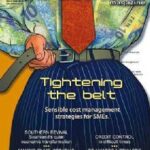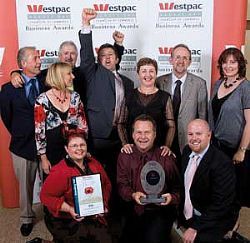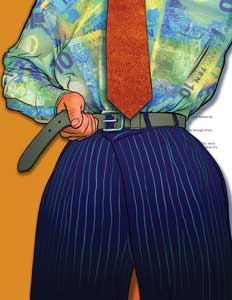HOW TO PICK A TOP ACCOUNTANT
Looking to change accountants, or about to start-up a business? This special report should help you to separate the good accountants from the great. By Patricia Moore.
Times are tough and could get a lot tougher for small business operators. However, a good accountant can help weather the storm, says Rowan Chapman, chief executive at WHK Gosling Chapman, chartered accountants and business advisers. It’s a fine time to separate the great from the good, he says. “A true test will be your accountant’s ability to be proactive and demonstrate initiative.” Qualified professional advice may be essential for any small enterprise or start-up, but choosing the right professionals is often where business owners find themselves floundering. Where do you start? And how do you know your decision is the right one? What should you expect in the way of services – and, if it becomes apparent you’re not on the same wave-length, what’s the next move? Big versus good can also be an issue. “Small firms may be marginally cheaper but they can’t always offer the same breadth of services and expertise,” says Craig Gower, a partner and business advisor at BDO Spicers Auckland. But, whatever the size of the firm, ensure you’re dealing with qualified chartered accountants (CAs), he says. “By starting out with a qualified professional, a business is effectively placing itself in a better position to succeed in the long run as the advice gained will influence future business decisions and directions,” adds Chapman. “A new business needs help to get on its feet quickly; a qualified accountant sets the pace right from the start offering expert advice on areas to concentrate on such as cashflow and profitability.” (It’s also important when you’re buying a business to get qualified professional advice, and do both financial and legal due diligence on all aspects of the business to ensure you’re aware of any risks or fish hooks you might otherwise miss, says Craig Gower.) Qualifications are obviously paramount, but Gower says it’s important to have a good personal fit and connection. “They will need to understand your business and personal affairs closely.” Reputation is another area to look at he says. “How long have they been in business? Have you heard of them – and have others? If you have any doubts seek references from their clients.” Your accountant should also be readily available and responsive, says Gower. “You don’t want to have to wait a year to get your accounts prepared or always hear back at the last minute.” He also advises business owners to get a clear understanding of the services that will be provided and, where possible, an understanding of the costs, and to look for other specialist skill services that will be important as the business grows. “Ideally your accountant will also provide accounting software and training on how to use it, to minimise the work required at the end of the year,” says chartered accountant Hannah McQueen, of financial management consultancy enableMe. Time saved should be spent with the business owner, she says. “Planning and measuring cashflow in conjunction with your bank manager, managing for growth and providing other forms of added value. A good accountant will also be a sounding board as and when required.” “Right at the outset a CA will provide an engagement letter spelling out the services they are to provide, who will provide the necessary input and when, and the outputs to be expected by the client,” says Tom Davies, director, professional support, at the New Zealand Institute of Chartered Accountants (NZICA). Davies says it may also identify the respective contact points within the client and CA firms. “And information on fees to be charged.” (To be fair, there are some good non-CA firms out there, says Tom Davies, but it’s worth noting that the term ‘chartered accountant’ is protected by statute and while, in theory, there are minor restrictions on who can call themselves an accountant, in practice “any incompetent can set up a shingle as an accountant”, he says.) Davies recommends clients ask for an estimate of the fees for the coming year, based on the identified services, at the start of each year. “A quote might be a bit unreasonable given the usual dynamics in a business, but the client should insist that if the CA firm becomes aware that its estimate is likely to be breached, then it will inform the client immediately so that the issues can be discussed and an agreement reached.” So what should you expect from your accountant? “Excellent compliance advice is a must,” says Rowan Chapman. “There are many tax requirements for a small business to consider including PAYE, income tax, FBT and GST. These must be handled correctly as interest and penalties can be significant if you get it wrong. Good accountants are also able to assist small businesses and start-ups develop systems to ensure these requirements are met.” It’s important the accountant a business operator chooses, has the experience and commercial know-how to offer services that go beyond compliance, says Chapman – “services that offer value at every stage of the business’s life cycle and continue to provide value to the owner and the business all the way through to succession and exit.” Like any other professional relationship, that between a business owner and his or her accountant can turn sour. “Hit it early on and go to the top,” says the NZICA’s Davies. “Call the principal of the firm and say ‘we need to talk’. Too often I see situations where unhappiness has been smouldering under a pile of increasingly abusive emails until the situation is beyond redemption.” When he gets calls at the Institute from clients complaining about their accountant, his first question is usually ‘have you discussed this with your accountant’, says Davies. “The common response is often, ‘no but I’ve emailed him’. I say arrange a face-to-face meeting over coffee and if that doesn’t work come back to me. It seems to work as I don’t get that many calls back.” Tough times, tough accountants? The next 12 months will be challenging for many small enterprises. So do tough times call for tough accountants? They must have the skill-set and the technology to help their clients through tough times, says Chapman. “They’re your last line of defence with the IRD; they know the rules and can structure your affairs to minimise tax and maximise cashflow, all within the law.” He says they’ll also understand the key drivers of a client’s business and be in the best position to direct a client’s attention to areas within the business that require action, and see them through the slowdown. BDO Spicers has just published a brochure of guidelines for clients advising them on surviving the current economic conditions, says Craig Gower. “We’ve identified five key areas of business people need to hone in on to ensure they maintain profitability – or just viability – and liquidity, over the next few years.” Businesses will need to monitor cash, be proactive, take fast and decisive action, prepare targeted and timely reporting, know their lenders, creditors and stakeholders and understand their duties to creditors. “Sometimes, even following all these guidelines isn’t enough, so people need to be sure they contact someone as soon as a critical situation is recognised. Waiting too long can mean that the time, money and patience needed to best address the issues at hand will be in short supply.” Cashflow will be the critical factor for small businesses during the next 12 to 18 months, says Hannah McQueen. “Working with an accountant to create cashflow forecasts and monitor these in conjunction with the bank will help many small businesses weather the storm.” Accountants can also assist with profitability analyses, she says. “There may be some areas of the business which are not making money; businesses should focus on areas which are profitable.” The great majority of chartered accounting firms are specialists in small business, because that’s what most of their clients are, says Tom Davies. “That’s where the experience comes from; dealing with lots of situations with lots of similar clients. If you’re considering engaging a particular firm ask if they can put you in touch with a couple of their clients and discuss with them the quality of the business advice provided.” Patricia Moore is an Auckland-based freelance writer. Email [email protected] Relevant websites: www.whkgoslingchapman.com www.bdospicers.com www.enableme.co.nz www.nzica.com www.roberthalf.co.nz 873




